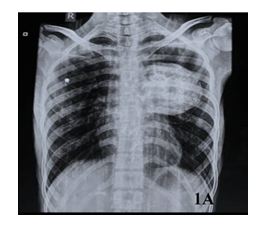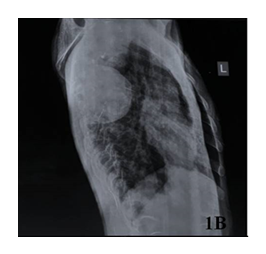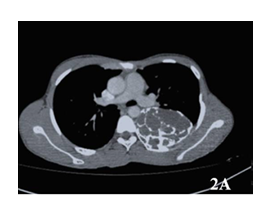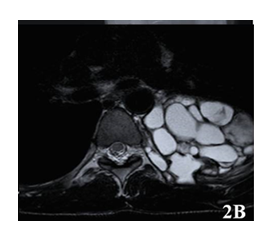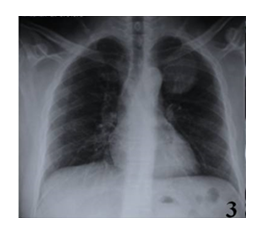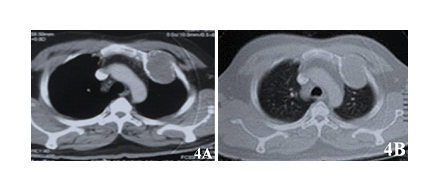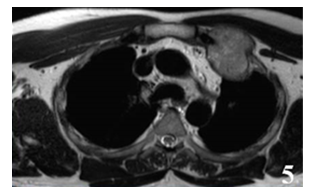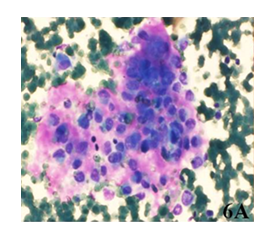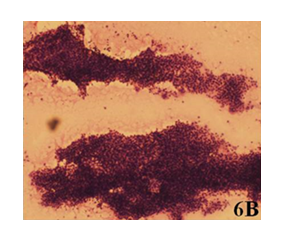Expansile Lytic Lesions of Rib: Two Rare Case Reports
Article Information
Dr. Priyanka Yadav, Dr. Lokesh Singh, Dr. Uma Debi*, Dr. Vikas Bhatia, Dr. Anindita Sinha, Dr. MS Sandhu
Department of Radiodiagnosis and Imaging, Postgraduate Institute of Medical Education and Research, Chandigarh, India
*Corresponding Author: Lokesh Singh, Department of Radiodiagnosis and Imaging, Postgraduate Institute of Medical Education and Research, Chandigarh, India
Received: 23 October 2019; Accepted: 20 March 2020; Published: 15 May 2020
Citation: Priyanka Yadav, Lokesh Singh, Uma Debi, Vikas Bhatia, Anindita Sinha, MS Sandhu. Expansile Lytic Lesions of Rib: Two Rare Case Reports. Archives of Clinical and Medical Case Reports 4 (2020): 428-434.
View / Download Pdf Share at FacebookAbstract
Of all primary bony tumors, chest wall is involved in only 5 – 8 % cases. Chondroblastoma and aneurysmal bone cyst (ABC) rarely occur in chest wall. Here, we would be presenting two such rare cases .One, a 26 year old male presenting with history of chest pain for 1 ½ year and other a 37 year old male with the chief complaint of pain in left shoulder for 3 years. X –ray, CT scan and MRI was done followed by guided FNAC and diagnosis of aneurysmal bone cyst in case1 and chondroblastoma in case 2 was made.
Keywords
Expansile lytic lesion; Aneurysmal bone cyst; Chondroblastoma; Chest Wall; CT; MRI
Article Details
1. Introduction
In skeletal tumors, metastatic bone tumors have the most common occurrence [1] and primary bone tumors of chest wall accounts for only 5 - 8 % of all bony tumors [2]. Of these approximately 95% occur in ribs and remainder in the sternum [3]. Fibrous dysplasia is the most common benign rib lesion followed by osteochondroma, and enchondroma [4]. Chondroblastoma and aneurysmal bone cyst (ABC) rarely occurs in chest wall. Here, we would be presenting two rare case of expansile lytic lesion of rib, one of aneurysmal bone cyst and other of chondroblastoma.
2. Case 1
A 26 year old male presented with history of chest pain for 1 ½ year with breaking of voice for 2 years. For which chest X ray PA and lateral view followed by CT scan and MRI was done. Chest X ray (Figure 1A) PA view revealed a heterogenous well defined rounded radio-opacity in left lung field in mid zone. On lateral view (Figure 1B) the lesion was occupying posterior mediastinum. Axial CT scan Bone window (Figure 2A) revealed exophytic, expansile, multiloculated lytic lesion of ~ 8.6 × 8.5 × 5.7 cm arising from the posterior aspect of left 6th rib. The lesion was extending into ipsilateral thoracic cavity along the left lower lobe posterior segment with passive atelectasis of adjacent lung parenchyma and mild compression of descending thoracic aorta, However fat plane with aorta was maintained. Extensive rim and septal calcification was noted within the lesion. No extension into neural foramina is noted. No associated soft tissue component was seen. Axial T2W MRI (Figure 2B) also revealed multiloculated cystic lesion with fluid fluid level in few loculation with low signal intensity peripheral rim. CT guided FNAC from the lesion demonstrated hemorrhagic content.
3. Case 2
A 37 year old male came with the chief complaint of pain in left shoulder radiating to left upper arm for 3 years. On chest x- ray, PA view showed (Figure 3), a well defined heterogenous round opacity in left lung field ,occupying the upper zone. Rest of the bilateral lung field was normal. On Axial CECT chest, mediastinal and lung window (Figure 4A and 4B) revealed a well defined expansile lytic lesion involving the left first rib on anteromedial aspect ,extending from 1st costochondral junction upto the angle of rib, measuring ~ 6.2 × 4.9 × 4.5 cm ( AP × CC × TR). There is incomplete peripheral rim of thin cortex , which was interrupted at places. The lesion was projecting towards pleura into thoracic cavity and anteriorly into the chest wall. No infiltration was noted into lung parenchyma or chest wall. Findings were suggestive of benign lesion likely chondroid origin. On Axial MRI T2W image (Figure 5), the lesion showed T2 hyperintensity consistent with chondroid matrix. USG guided FNAC was done. Figure 6A (Giemsa 400X): demonstrate mononuclear chondroblastic cells, singly dispersed and in loose cohesive clusters these cells are round to polygonal, with solitary ovoid nuclei, finely granular chromatin, inconspicuous nucleoli and occasional nuclear grooves. Figure 6B (Giemsa 100X): smears were hypercellular with sheets and individually scattered mononuclear chondroblastic cells, and diagnosis of chondroblastoma was made. The lesion was surgically excised.
Figure 4 A-B: (Axial CECT chest) Mediastinal and lung window shows well defined, expansile, lytic lesion involving the left first rib on anteromedial aspect, extending from 1st costochondral junction upto the angle of rib, with incomplete peripheral rim of thin cortex, which is interrupted at places.
4. Discussion
Rib lesions can be traumatic, metabolic, inflammatory, neoplastic or related to congenital disorders. Among neoplastic lesions, metastasis is the most common malignant rib lesion, mostly with primary from breast, prostate gland, lung, or kidney. Chondrosarcoma is the most common primary malignant rib lesion, usually occurring at or near the costochondral junction [12]. Most common differential for expansile lytic lesions of bone are –fibrous dysplasia, unicameral bone cyst, aneurysmal bone cyst, chondroblastoma, osteoblastoma, chondromyxoid fibroma and metastasis (renal, thyroid and breast), lymphoma(diffuse large B cell), leukaemia, langerhans cell histiocytosis [5]. Fibrous dysplasia is most common benign tumour of rib where as metastasis and myeloma are most common malignant tumours of rib. Plasmacytoma is another differential diagnosis of expansile lytic lesion of rib which occurs as a result of destruction of the cortex of bone with extension into surrounding soft tissue [6]. Although percutaneous biopsies of rib lesions under image guidance has high diagnostic yield ,lesions with no associated extra-osseous component have a lower biopsy success rate [13]. Unless proven otherwise, all rib lesions must be considered as potentially malignant.Prompt intervention is required .Wide resection with tumor-free margins provide the best chance for cure in both benign and malignant lesions [14].
4.1 Aneurysmal Bone Cyst
Aneurysmal bone cyst can occur as primary as well as secondary tumors. Primary lesion occur commonly under 30 years of age. Clinically they present with mild pain, swelling and restricted movement [11]. On imaging appear as a well defined solitary expansile osteolytic bone lesion, filled with blood. It is because of its expansile nature that it had been named as aneurysmal bone cyst. Aneurysmal bone cyst is composed of numerous blood-filled arteriovenous communications [11]. Expansion of these cysts is due to increased venous pressure or secondary to trauma. It is a metaphyseal or diaphyseal tumor involving usually the long bones. ABC involving the ribs has rare occurance. On MR imaging, it shows multi-lobulated mass lesion with thin peripheral rim of low signal intensity [7]. Presence of fluid levels indicating hemorrhage, is not pathognomonic as it can occur in primary as well as secondary tumors [8].
4.2 Chondroblastoma
Chondroblastoma classically involves the epiphyseal region of long bones and occurrence in chest wall is rare. It is located at an ossification site and is therefore usually found at the costo-chondral or costo-vertebral junction. The lesion may look aggressive on a CT. MRI shows considerable edema in the bone marrow and adjacent soft tissues. [9]. In chest wall it usually involves ribs and scapulae. If found in ribs, it is encountered at later age as compared to its usual occurrence in 2nd decade. As it arises from ossification centre costo-vertebral or costo-chondral junctions are typical site of occurance. These tumors can show aggressive nature and are difficult to differentiate from malignant tumors [10]. Aneurysmal bone cysts can occur secondarily in these tumors. Associated soft tissue and bone marrow edema can be seen.
5. Conclusion
Aneurysmal bone cysts (ABC) and Chondroblastoma have rare occurrence in chest wall. ABC can be primary or secondary with multiloculated appearance. Fluid levels are seen in both primary as well as secondary tumors. Chondroblastoma typically involves costo-vertebral or costo-chondral junctions with later age of occurrence as compared to classical tumors which occur in 2nd decade.
References
- Greenspan A, Jundt G, Remagen W. Differential diagnosis in orthopaedic oncology. 2nd ed. Phila-delphia, Pa: Lippincott Williams & Wilkins (2007): 458-480.
- Teitelbaum SL. Twenty years experience with intrinsic tumors of the bony thorax at a large institution. J Thorac Cardiovasc Surg 63 (1972): 776-782.
- Waller DA, Newman RJ. Primary bone tumours of the thoracic skeleton: an audit of the Leeds regional bone tumour registry.Thorax 45 (1990): 850-855.
- Incarbone M, Pastorino U. Surgical treatment of chest wall tumors. World J Surg 25 (2001): 218-230.
- Hartenstine J, Jackson H, Mortman K. A 38-year-old woman with an osteolytic rib lesion. Chest 149 (2016): e79-e85.
- Sharma D, Rawat V, Yadav R. A rare case of multiple myeloma presenting as lytic lesion of the rib. J Clin Diagn Res 10 (2016): 20-21.
- Beltran J, Simon DC, Levy M, et al. Aneurysmal bone cysts: MR imaging at 1.5 T. Radiol 158 (1986): 689-690.
- Hudson TM, Hamlin DJ, Fitzsimmons JR. Magnetic resonance imaging of fluid levels in an aneurysmal bone cyst and in anticoagulated human blood. Skeletal Radiol 13 (1985): 267-270.
- Zarqane H, Viala P, Dallaudière B, et al. Tumors of the rib., Diagn Interv Imaging 94 (2013): 1095-1108.
- Mayo-Smith W, Rosenberg AE, Khurana JS, et al. Chondroblastoma of the rib: a case report and review of the literature. Clin Orthop Relat Res 251 (1990): 230-234.
- Eisenberg RL. Bubbly Lesions of Bone. Am J Roentgenol 193 (2009): W79-W94.
- Levine BD, Motamedi K, Chow K, et al. CT of rib lesions. Am J Roentegenol 193 (2009): 5-13.
- Sakellaridis T, Gaitanakis S, Piyis A. Rib tumors: a 15-year experience. Gen Thorac Cardiovasc Surg 62 (2014): 434-40.
- Jakanani GC, Saifuddin A. Percutaneous image-guided needle biopsy of rib lesions: a retrospective study of diagnostic outcome in 51 cases. Skeletal Radiol 42 (2013): 85-90.

